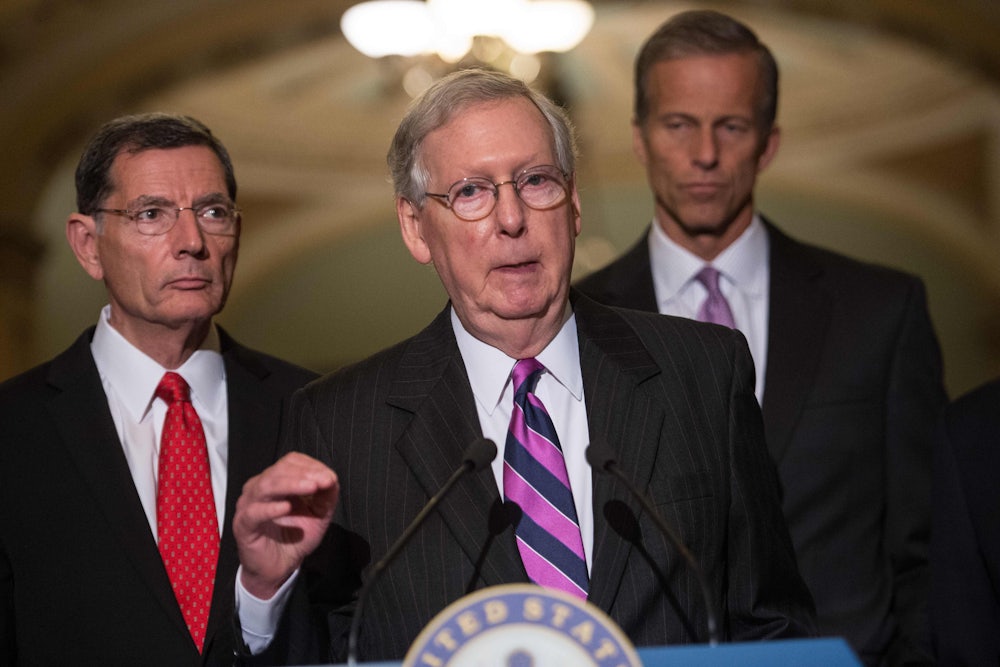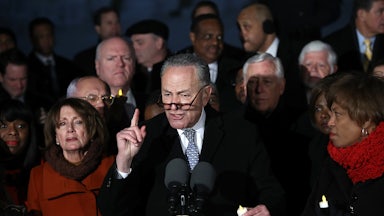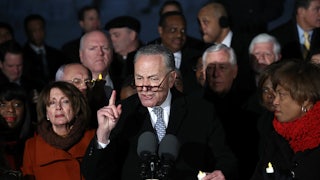Last August, Missouri voters made themselves perfectly clear when they voted to expand the state’s Medicaid program, passing a ballot measure with 53 percent of the vote. It was just the latest in a series of recent victorious expansion campaigns in red-leaning states, including Maine, Oklahoma, Idaho, and Utah, aimed at plugging a gaping hole in the Affordable Care Act created by the Supreme Court. While the high court’s 5–4 ruling in National Federation of Independent Business v. Sebelius was, in 2012, hailed as a victory for upholding the legality of the individual mandate, there was less attention paid to what turned out to be a far more consequential caveat: that the choice of whether to extend Medicaid eligibility to cover all residents below 138 percent of the federal poverty line would be left to individual states. Several Republican-run states used their newfound leverage to win concessions from the federal government, such as lifetime benefit caps or monthly premiums that were never supposed to be part of a public safety net program intended for vulnerable patients. Many other states under GOP control took a more destructive path, refusing to change their Medicaid eligibility requirements at all and stranding some four million people without insurance; this included more than 200,000 Missourians.
Ironically, nearly a decade after the Sebelius ruling, we have come to understand that the individual mandate barely mattered at all to the law, and that Medicaid expansion accounted for far greater gains in insurance rates than tinkering with the individual market produced. We also have years’ worth of research on the tremendous impact Medicaid has on patients’ lives: Enrollees were able to access and use more necessary care; their health outcomes improved; and they experienced greater financial, professional, food, and housing security. This smorgasbord of quality-of-life gains was remarkable enough to win over large margins of the country’s most ostensibly conservative voters.
In Missouri, that may not be enough. The state Senate has voted 20 to 14 against funding the winning measure, effectively punting the issue to the courts to determine whether a cut-and-dry referendum ought to be acknowledged. You’d be hard-pressed to find a purer distillation of the Republican Party’s nihilistic political project anywhere in the country.
The federal government currently covers 90 percent of Medicaid expansion costs, which leaves Missouri on the hook for only $130 million per year, a number quite a bit lower than its $1 billion budget surplus. And that’s before you consider added incentives in the American Rescue Plan Act, which would make expansion an even more plum deal for the state—and which Republicans in other states have likewise signaled will not thwart their opposition to Medicaid. In short, adding a few hundred thousand people to Missouri’s Medicaid rolls is startlingly cheap for the state itself, and could be accomplished using money already left over in the state’s coffers. Even the federal portion of the expansion would run less than $2 billion annually—a crumb of the overall federal spending pie.
If Republicans’ objections to Medicaid are clearly not fiscal, they are ruthlessly ideological: If expanding Medicaid wouldn’t bankrupt Missouri, it does further entrench a critical public welfare benefit for residents who fall well beyond those the right-wing would define as the most pathetic and deserving, thereby broadening the constituency for the sort of robust public programming it vehemently opposes. This has a significant political impact: Poor and disabled Medicaid recipients eligible before the ACA—those earning less than 21 percent of the federal poverty line in Missouri—were among the least likely to vote at all, much less vote for Republicans.
The expansion of the overall population of Medicaid beneficiaries has lent the means-tested insurance program wider and deeper support than it’s enjoyed in the past, more akin to the affection showered on Medicare. This helps explain why protests born out of a fierce loyalty to Medicaid in particular played a major role in saving the ACA from near ruin in 2017. Nevertheless, the idea of whetting appetites for an expanded welfare state is anathema to Republican goals, which boil down to enriching their plutocratic donors as much as possible and maintaining a haggard surplus workforce who are desperate enough to work for scraps—designs that are undermined by collective security that expanded health care benefits bestow. As state senator Andrew Koenig put his objection to funding the measure, “I’m sorry, if you are a healthy adult, you need to get a job.”
Serving the interests of the ultrarich is inherently undemocratic—but when Republicans aren’t obfuscating their disdain for democracy with disingenuous bloviation about nonexistent voter fraud, they make their position gobsmackingly plain: “If voters had all the information we do, I think they would have made a different decision,” Missouri Republican Senator Dan Hegeman asserted as he voted against funding the winning ballot measure. Representative Justin Hill took an even more paternalistic approach: “Even though my constituents voted for this lie, I am going to protect them from this lie.” Direct ballot measures are far from problem-free, but for all their faults, no form of electoral decision-making isolates voters’ desires quite as vividly. Beyond that, “having information” is hardly a prerequisite for voting, even if you presume the voters aren’t as savvy as the lawmakers who govern their lives.
If spiking the will of Missouri’s voters in this way is particularly brazen, it’s hardly novel for the GOP: Not only have voter suppression tactics become commonplace in recent years, so too has heavy gerrymandering at the state and national level—a practice that’s been to the Republican Party’s electoral benefit. More recently, the outright rejection of straightforward election results has been encouraged at the highest levels of government—months after a violent Capitol siege sparked by delusions of an election stolen from Trump, a majority of self-identifying Republican voters insist the election was rigged.
But the Missouri GOP’s attack on Medicaid expansion—a move clearly demanded by a majority of voters, many of whom knocked doors and had painstakingly detailed discussions with neighbors about why it’s good to distribute health care by need rather than ability to pay—cuts through all that. The problem with well-funded public programs is they divert money from private markets and put it toward things that ordinary people need to thrive. If a means-tested program like Medicaid isn’t nearly enough to assuage the health care crisis in this country, expanding its rolls is still more than the right can bear. Their guide star is simple: The smaller the welfare state is, the richer the richest people can get.








